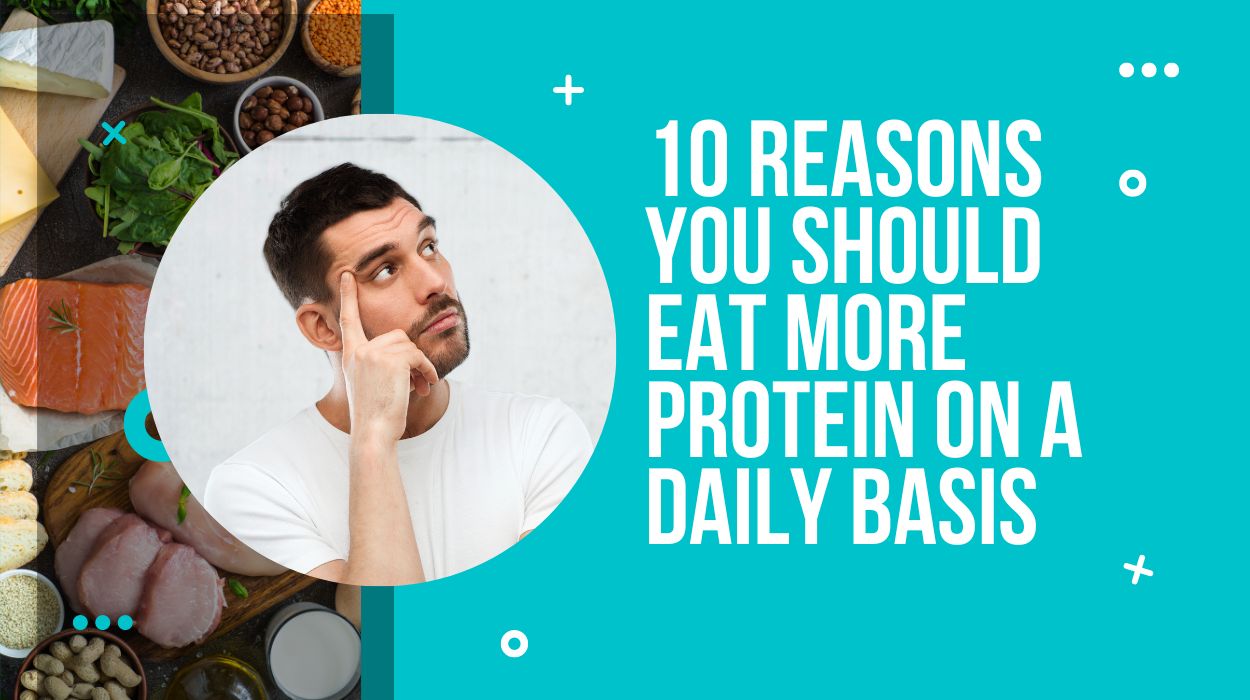A common misconception is that a high-protein diet is only for athletes and bodybuilders. Protein is a prime component in overall wellness and health. Our body isn’t capable of storing protein, and hence daily consumption in the proper amount is essential for a healthy body. A human body requires macronutrients in a substantial and proteins are considered a macronutrient.
Protein is an essential component of the process that provides energy and transports oxygen to the blood. Lack of protein can cause serious health issues. Follow this article through to the end to understand why you should eat more protein.
10 Reasons Why You Should Eat More Protein:
Proteins are made up of amino acids. Due to the presence of amino acids, the proteins are treated as an essential micronutrients. High protein consumption makes your skin look radiant. It also makes your hair and nails grow faster and more robust.
1. Lowering appetite
This generation prefers to take out and develops a habit of eating junk food. It is very addictive and increases the amount of fat in your body faster. High protein intake helps fight hunger. Protein lowers hunger-inducing hormone called ghrelin. It also causes a surge in the hormone called a peptide, which gives you the sensation of being full. Increase your protein intake to avoid getting the urge of sneaking into the kitchen to grab a midnight snack.
2. Improves muscle mass
Protein is needed to build muscle mass by providing nutrition. Protein places your body in a ‘catabolic state’ during weight loss and prevents muscle loss. It also helps repair tears incurred in muscles during a workout. High protein intake helps you healthily lose weight. Eating a protein-rich diet helps in cutting down calories. Athletes and bodybuilders are recommended to take protein supplements to provide strength. Also, patients with chronic disorders are often asked to increase their protein intake.
3. Robust
Protein deficiency is not good for older adults as their bones become fragile and brittle with age, and lack of protein may make them look leaner and weaker. Milk is a protein reserve and is packed with nutrients like potassium, calcium, phosphorus, magnesium, vitamin D, vitamin K, and vitamin B12. Many believe that high protein intake can peak urinary calcium and cause damage to the bones. The decaying of bones caused due to insufficient protein can lead to osteoporosis. Besides providing structure to the bone, protein improves calcium absorption and enhances IGF – 1 level.
4. Weight loss
We know that the faster the metabolic rate, the quicker you lose weight. High levels of protein intake amplify your metabolic rate and burn more calories. Protein also has a substantial thermic effect on food (THF), and eating protein in an appropriate amount can help you burn 100 calories per day. Protein advances the thermogenesis process and increases the temperature of the body to ease the burning of fat. Increasing water intake along with protein intake takes you a step further in your weight loss journey. Ditch your sugary drinks for water and increase your protein intake to get quick and better results.
In a study supported by the Austrian science fund (FWF), it was observed that people who took 29% of the protein in their diet had better metabolic rate and hence Faster fat burning tendency than people that had 11% protein intake.
Read More: How To Use Protein Shake For Weight Loss
5. Repairs body post-injury
Protein helps in repairing the torn muscles and gaining strength and muscle mass. Taking protein in the required amount every day is vital if you go to the gym and perform heavy weight training. Integrate hydration and high protein intake pre-workout and post-workout to help your body recover faster.
Proteins are called the building block of tissues and organs for a reason. Doctors recommend that people who suffer from long-term illness and serious physical injury cut down on carbohydrates and increase protein consumption.
6. Immunity booster
The immune system releases antibodies that help fight against bacterial and viral infection. Antibodies are composed of proteins, and if the human body lacks protein, your immune system cannot defend itself from these bacteria and viruses. High protein intake helps your body fight illness quickly and effectively.
In addition, proteins are high reserves of minerals like magnesium and zinc that also improve the immune system. People with a frail immune system often get ill; for such people, it is necessary to have a high-protein diet to enhance their immune system.
7. Lowers blood pressure
Looking at every house, we can find at least one high blood pressure patient. High BP is one of the prominent causes of cardiac arrest and kidney diseases. High protein intake helps lower your chances of getting hypertension. The heart, kidneys, blood vessels, and hormones work concurrently to manage blood pressure levels, and protein helps ease this process. Proteins act as Angiotensin-converting-enzyme (ACE) inhibitors and contain arginine, which expands blood vessels and keeps a check on the blood pressure levels. People who face a hard time maintaining their blood pressure should maximize their protein intake.
A study published in the national library of medicine showed that increased protein intake significantly lowers systolic and diastolic blood pressure. Keeping the systolic and diastolic blood pressure in the suitable range gives a positive cardiovascular outcome.
8. No harm to kidneys
Patients with kidney disorders highly benefit from limiting protein intake. Although a high protein diet can cause harm to patients with pre-existing kidney disorders, it does not harm people with healthy kidneys. Check out the study published in the national library of medicine about the impact of a high protein diet on the kidneys.
9. Supply essential amino acids
On the consumption of protein, the body breaks it into amino acids that perform vital functions like absorption of vitamins, increased metabolism, protection against deadly viruses, boosts energy, and increased muscle growth.
The amino acids are not produced by the human body and must be obtained from food. Deficiencies in protein can lead to significant repercussions.
The human body damages and rebuilds itself persistently. It also breaks down and rebuilds the cells every week. The body also builds DNA muscles and regulates hormones. The body needs high amounts of protein to perform all the functions. Amino acids also help with building proteins.
10. Modulate hormones
Protein targets the hypothalamus, which is responsible for regulating hormones. The body releases the hormone, which gives you the sensation of hunger. High protein intake increases the GLP – 1, peptide, and cholecystokinin levels, increasing satiety levels. High satiety levels give you a good chance of losing weight because you eat less: GH and IGF – 1 help regulate protein metabolism.
If this further interests you, you can check out the study on how hormones impact the rate of protein synthesis on the national library of medicine website.
AUTHORS NOTE –among all fruits, guava is the most protein-rich Fruit, and it also contains Vitamin C and fiber.
FAQs
What are some foods with rich sources of proteins?
Lean meats such as pork, lamb, beef, etc., poultry animals like chicken, duck, turkey. Seafood like crab, lobsters, fish, and clams. Some foods like yogurt, milk, and cheese have rich protein sources for vegetarian people. Adult women require about 46 grams of protein per day, whereas men require 56 grams. (Source)
What happens if we eat too much protein?
The body does not utilize the excess protein. Over intake of protein can cause pressure on the kidneys and liver. High protein intake may also cause heart disease. Also, people who might develop kidney stones should carefully administer their protein intake. Remember, too much of anything has side effects.
Conclusion –
Protein is divisive to lead a long and healthy life. High protein intake offers a wide range of benefits like it controls your cravings, boosts the immune system, increases muscle mass, quick recovery from injuries, etc.
I hope by now I have convinced you to increase your protein intake. There are ample options to choose from foods rich in protein. Let us know in the comments section below which is your favorite source of protein.








